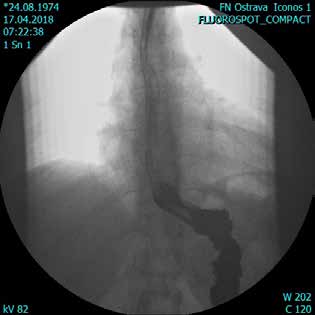Abstract
Obesity has become a global problem with increasing prevalence. Undoubtedly, bariatric surgery is the most effective way to treat morbid obesity. Laparoscopic sleeve gastrectomy (LSG) is currently the most commonly performed bariatric procedure worldwide. The prevalence of gastroesophageal reflux disease (GERD) is also increasing, a close association with increasing prevalence of obesity being regarded as the main cause of this trend. The relationship between LSG and GERD is still unclear, at least controversial. If GERD occurs in the postoperative period, the first therapeutic intervention is initiation of proton pump inhibitors (PPI) treatment, which is effective in the vast majority of patients. In patients resistant to this treatment, conversion to laparoscopic Roux en Y gastric bypass (LRYGB) is usually necessary. The authors present the case report of a patient who developed GERD in the longer postoperative period and conversion to LRYGB was not appropriate due to previous complications and surgical procedures. Therefore, this patient was managed operatively by an alternative method – hiatoplasty with partial posterior fundoplication. The success of the treatment was confirmed clinically by disappearance of GERD symptomatology postoperatively even after PPI discontinuation. LRYGB is the method of choice for GERD after restrictive bariatric procedures. However, some patients are not suitable for conversion to LRYGB, and alternative treatment options are therefore needed.

